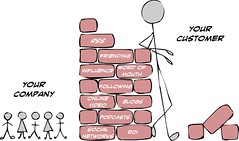
What should be the sales manager’s role in the new world of the 21st Century? Markets and customers have changed out of recognition from the earliest days of the Industrial Revolution, but sales management hasn’t. Does it need to? And if so how? To What? Do sales managers need a new strategy, and if so how can they decide what it should be?
Whereas markets used to be local, and products expensive, and hard to get hold of, they are now global, and awash with competition.
Customers used to be desperate to get hold of the new manufactured goods. They’d happily waited for delivery, tolerated products which didn’t really do what it said on the tin. They suffered poor customer service in silence, and paid outrageous prices for it.
Not anymore they don’t. Today’s customers are smart, informed by the Internet, about anything. They’re sceptical after so many stories about rip off companies getting found out, and brought to book by the authorities. And they don’t have a problem finding things to do with their money. Nowadays they have problems finding the money to do things.
And here’s where the sales management problem shows its ugly head.
Most sales managers, and virtually all of their bosses, think sales is a numbers game. Regardless of the product, the answer in sales operations is always the same. Pitch more prospects. The more prospects you pitch, the more customers you’ll get.
In some industries this neanderthal thinking still works. But not many, and not for long.
In the other businesses the competitive landscape changes almost daily. What worked yesterday is a recipe for disaster today. The competition has changed the rules. Customers know more about what’s available, at what prices, than the sales people. They know what works for others like them, and aren’t going to get suckered.
Examples are always helpful when trying to understand something new. In this case Amazon is vendor to watch. The site has found an entirely new value proposition – knowing of customers’ interests, finding the most engaging offers amongst its partners, and listing the comments of people who’ve bought it.
Amazon has found a way to own the customer – not as a supplier, but as an agent. It knows what interests each buyer. It persuades vendors to offer best prices, then asks customers to review what they bought. It shows the reviews alongside the sellers pitch. Now you Ms. Customer have the best price going for the product, together with reports of people like you who decided to buy it.
And that’s going to be, more or less, the model for all selling in the 21st. Century.
Most sales managers won’t be have the sort of power Amazon wields – brand, access to customers’ attention, lowest cost supply of products or services, insight as to customer’s interests and infinitely scalable information technology. They can’t do a selling job the way Amazon does a selling job.
But they can do the things it does, in their own way. Instead of pitching more prospects harder and discounting prices deeper, sales organisations can own the customer with their own version of the sales model.
They’ll have to figure out precisely how to do it. Every business is different, after all. But there are some basic principles they’ll need to build into their model.
- Understanding the customer
- Offering the very best value available
- Managing the customers’ risk
The role of sales people has to change.
Instead of delivering information in sales presentations, they need to collect information, about the customer, the competition, and where things could go wrong.
Instead of asking for the order they need to ask their bosses to organise the business resources so as to deliver outstanding value.
Instead of discounting the price, they need to manage the risk.
And if they can’t come up with a more attractive, transparent, proposition than their competitors they need to find another job.
That’s the sales model every manager should be looking for, and the sales professionals with the skills to execute it.



